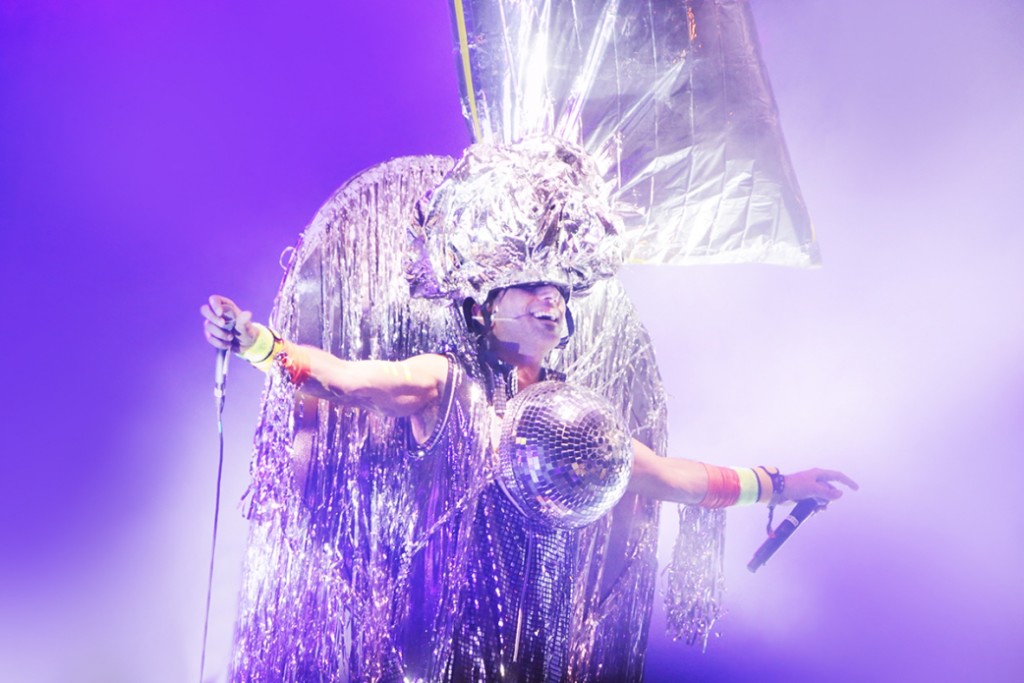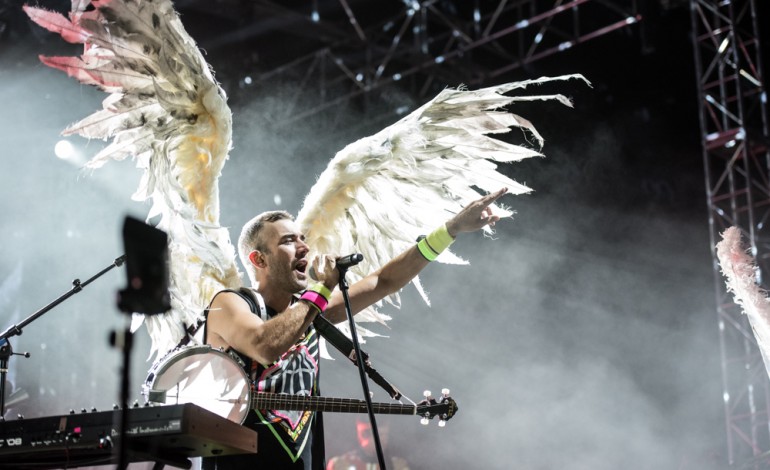
A ten-foot tall tinfoil man is on the Hollywood Bowl stage. He is quite literally shining, with a wrapped foil hat perched on his head and his body draped in mylar sheets and silver streamers, bedecked with disco balls and shimmering John Lennon shades.
This is Sufjan Stevens. He is in the middle of his 25-minute opus “Impossible Soul”, from 2010’s Age of Adz. His voice is fading in and out, flitting between whispery croon and autotuned wail.
“I couldn’t give my best, I couldn’t give my best” — his voice lowering, lips touching his mic, arm outstretched, toeing the line between human, god and robot — “like Kanye West.”
No one understands what is going on. Is this suddenly an homage? Cheeky cultural commentary? It becomes even more confusing when, among chants of “Don’t be distracted,” the tinfoil man disappears and Sufjan emerges in a suit of neon-colored balloons, running across the stage and weaving up the audience and back again to dance with his similarly shiny, neon-colored backup singers. The autotune is gone and a trail of balloons hover slightly off the ground, as if by magic. A rainbow lights up over the Bowl stage.
The audience lets out breathless laughter, cheers. Where are we? What is going on? Do we care about these details, really? There is so much color, so much light, so much of everything. As Sufjan might put it, logic has made way for life.
“Boy, we could do so much together,” a female vocalist sings.
“It’s not so impossible,” he replies calmly, balloons shed on the ground and tinfoil hat askew. “Nothing is impossible.”
***
Sufjan Stevens toes the line between real and ethereal so often that it’s hard to discern which he is at any given time. From the start of the night, when he emerged in a baggy rave-ready jumpsuit and spread out a giant pair of feathery wings behind him, Sufjan evoked enough angelic imagery to convert any skeptics in the crowd into believing in some kind of higher power, be it spiritual or musical. The spotlight was a soft dimmed gold filtered through his wings, his voice dreamy as he told us from the onset, “Movement is life, life is love, so let’s keep it moving.” Sufjan would have a very successful side job starting a new religion, or perhaps teaching yoga.
More so than pretty much any artist active today, Sufjan Stevens is the human embodiment of his music. As such, it seems as if he is barely tethered to the existing world, his feet planted in Brooklyn but his mind drifting far beyond what we know to be real. One second, he’s just a regular guy, albeit a regular guy who smashes banjos on the Hollywood Bowl stage and says things like, “I cried myself to sleep last night” or, “I’m going to dig deep into my big bag of funsies” with a dead serious face. He’s got these dorky, earnest dance moves, accented by an endearing dimpled smile that reassures you that when he says he’s your friend, he means it. When he gestures out toward the crowd, all the way up to the cheap seats, and sings that all of him wants all of you, it’s such a vulnerable and honest display of emotion that the only word that can describe him at that moment is human.
But blink and you’ll miss it — suddenly, he’s an otherworldly musical conduit channeling the word of God on his synth board. It came to him in a dream the night before, he says, as he dreamt of flying over Los Angeles and into the heavens and behind a shimmering curtain of gold and red was his God, a burning ball of fire and light that spoke to him in the language of music and left us wondering if Sufjan Stevens had just reinvented Christianity, in his own way.

He said that this vision inspired his performance for the evening.
“I’ve been singing too many songs about death,” he explained, “so tonight, we’re going to sing about life.”
If you can believe it, some of the crowd audibly groaned at this, because if you’ve given his latest record Carrie & Lowell a listen, you’ll know that Sufjan is actually quite good at singing about death. But he’s also quite good at singing about anything, really. He could sing your entire contacts list in his breathy, acoustic singer-songwriter style, and we would still cry.
Anyway, we didn’t need to worry: he did perform some of his more somber songs like “Vesuvius” and “Fourth of July” and “Should Have Known Better” that night. And he did so with bright lights and unabashed spectacle, quite possibly the last thing you’d expect to accompany lyrics like, “The panic inside / the murdering ghost that you cannot ignore.” Watching Sufjan climb on top of his piano in a bright pink and green tank top, or seeing him and his backup singers perform synchronized dances along to weeping acoustic guitar solos — This is all wrong, you think, until you realize it’s not. Because even in his most painful songs, even in his songs about death, Sufjan finds life.
He did rip out the crowd’s collective heart and reduce us to tears, as we had all expected between sips of cheap wine earlier in the evening. Sadness and pain is a powerful, instinctive reaction to raw emotion put to melody, and that’s basically Sufjan Stevens’ entire discography. But like actual emotion, there’s a multifaceted poetry to his songs, something deeper than a first impression of heartbreak. Somewhere among his crooning “We’re all gonna die” over and over, things started to feel okay again, because admitting the worst is how we to begin to heal. When he sang, “My brother had a daughter / the beauty that she brings / illumination,” wounds split open by these same songs were sown back up with the reminder that death is counterbalanced by life, and life is actually really goddamn beautiful.
We’ve heard these lines about life so many times before that they might sound like broken cliches by now. But after the way that Sufjan delivers it — the way he celebrates it, boldly onstage in front of thousands, embracing it with childlike joy — you wind up so full of so much life yourself that you can’t physically hold it all in, so you start crying again, or you start cheering, or you dance and sing along as loudly as you can because you’ve finally started to understand what Sufjan’s already figured out.
And that’s when the question comes back up: how can a single human being, especially one dressed like a 90s rave kid covered in balloons and shiny mylar, make us feel this way? How is this — the music, the spectacle, Sufjan Stevens himself — how is any of this possibly real?
***
In his giant tinfoil hat, the beautiful angel hippie genius Sufjan Stevens closes his Hollywood Bowl debut with a euphoric rendition of “Chicago”, and encores with a cover of Prince’s “Kiss” featuring guest vocalist Moses Sumney. He tells the crowd he loves us. “God bless you all,” he says, bright stage lights reflecting off of his hat. He stands there for a while, taking everything in, blinding us with his tinfoil rainbow, and we know he means it. All of it. And then he is gone.
The show is over, but there is still color everywhere. There is light and life everywhere. Like the tinfoil man, our hearts are full.
